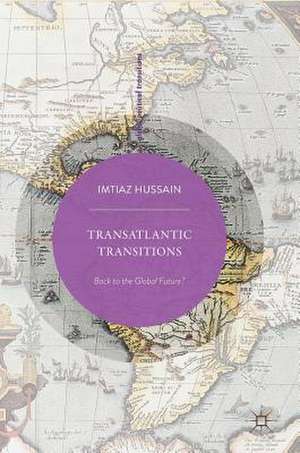Transatlantic Transitions: Back to the Global Future?: Global Political Transitions
Autor Imtiaz Hussainen Limba Engleză Hardback – 22 feb 2018
| Toate formatele și edițiile | Preț | Express |
|---|---|---|
| Paperback (1) | 638.43 lei 6-8 săpt. | |
| Springer Nature Singapore – 9 feb 2019 | 638.43 lei 6-8 săpt. | |
| Hardback (1) | 643.84 lei 6-8 săpt. | |
| Springer Nature Singapore – 22 feb 2018 | 643.84 lei 6-8 săpt. |
Preț: 643.84 lei
Preț vechi: 757.46 lei
-15% Nou
Puncte Express: 966
Preț estimativ în valută:
123.20€ • 128.97$ • 101.94£
123.20€ • 128.97$ • 101.94£
Carte tipărită la comandă
Livrare economică 05-19 aprilie
Preluare comenzi: 021 569.72.76
Specificații
ISBN-13: 9789811066078
ISBN-10: 9811066078
Pagini: 260
Ilustrații: XVII, 282 p.
Dimensiuni: 148 x 210 mm
Greutate: 0.51 kg
Ediția:1st ed. 2018
Editura: Springer Nature Singapore
Colecția Palgrave Macmillan
Seria Global Political Transitions
Locul publicării:Singapore, Singapore
ISBN-10: 9811066078
Pagini: 260
Ilustrații: XVII, 282 p.
Dimensiuni: 148 x 210 mm
Greutate: 0.51 kg
Ediția:1st ed. 2018
Editura: Springer Nature Singapore
Colecția Palgrave Macmillan
Seria Global Political Transitions
Locul publicării:Singapore, Singapore
Cuprins
Chapter 1: Introduction: Transatlantic Hues & Paradigmatic Cues.- Chapter 2: Southern Transatlantic Flows: Silver Bullets.- Chapter 3: Transatlantic Settlers, Slaves, & Courtyard Knaves: Telescopizing Space.- Chapter 4: Central America in Transatlantic Transactions: Global Commodity Central?.- Chapter 5: North-South Transatlantic Trajectories: Comparative South American Experiences.- Chapter 6: Muslims in the 'Transatlantic' Zone: Different Stripes?.- Chapter 7: Transatlantic Democracy: Of Soft Contenders.- Chapter 8: Conclusions: Transitions & the 'Transatlantic' Playground.
Notă biografică
Imtiaz Hussain specializes in International Relations/Negotiations, and Conflict Studies. His publications include North American Regionalism and Global Spread (Palgrave 2015); Evaluating NAFTA: Theory and Practice (Palgrave, 2013); Border Governance and the ‘Unruly’ South (Palgrave 2013), North America’s Soft Security Threat (Palgrave 2013), Afghanistan-Iraq and Post-conflict Governance (Brill 2010), The Impact of NAFTA on North America (Palgrave 2010), North American Homeland Security (Praeger 2008); Running on Empty Across Central America (University Press of America 2006), and Globalization, Indigenous Groups, and Mexico’s Plan Puebla Plan (Edwin Mellen 2006); and articles in Handbook of Global Security and Intelligence (2008), South Asian Survey (2008), Politics & Policy (2008), Journal of the Asiatic Society of Bangladesh (2006), Norteamérica (2006); among others. A recipient of over12 international fellowships and 8 teaching awards, he graduated from the University of Pennsylvania (1989).
Textul de pe ultima copertă
With North Atlantic post-World War II transatlantic dynamics as the subject, this volume inquires if its theoretical tenets hold in other epochs and Atlantic arenas. Both case and comparative studies of such historical cases as the silver, slave, and commodity trades, and whether ideas, such as faith and democracy, have as much impact as these merchandise flows, simultaneously challenge and strengthen the transatlantic paradigm. They permit transatlantic relations to be stretched as far back as to the 8th Century, in turn exposing transatlantic flows hugging global threads, while revealing the strength and size of several unaccounted types of transatlantic transactions, such as the north-south varieties.
Caracteristici
Explores ?transatlantic transactions as cause and consequence of globalization Delves into north-south and south-south transatlantic relations Highlights mindsets (like ideas) behind transactions (as in flows)














